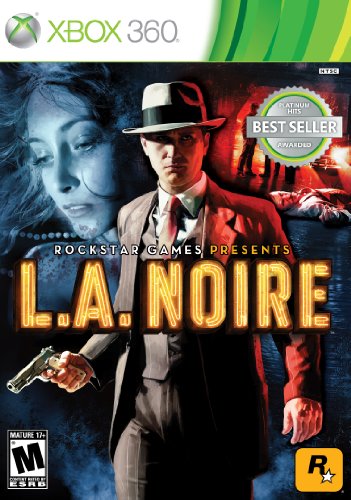L. A. Noire
If you’re wondering how to reconcile the high mark to the left with the paragraphs of red ink below, let me explain. L.A. Noire is a very good game that wears all its faults on the outside.
It boasts several major achievements. The first is MotionScan, the facial animation technology that represents the boldest effort yet to bridge video games’ Uncanny Valley of facial expressions. The game’s interrogations are meant to put the technology front and center, asking the player to read these facial cues to sift truth from lies.
The second is its detailed portrayal of post‐war Los Angeles. I’m no expert, but they don’t seem to have taken many shortcuts here. They’ve modeled nearly one hundred real‐life vehicles, all of which are driveable within the game. They claim to have recreated 90% of downtown L.A. with painstaking fidelity to architecture. The wardrobes, the music, the signage… hardly anything feels anachronistic.
These things are well worth bragging about. But they have nothing to do with the gameplay. L.A. Noire mixes slow, static scenes, like interrogations and crime scene examinations, with open‐world, sandbox‐style tasks on a city map. These are tough to blend. It’s disorienting for a game to feel like Heavy Rain one minute and Grand Theft Auto IV the next.
Something else bothers me more, though. At moments few and far between, L.A. Noire is simply no fun to play, and the fact that it was fun to look at was the only thing that pushed me out of the ditch. Yes, it’s nice to be able to “read” characters, but not within the context of a dialogue tree that combines the worst aspects of Encyclopedia Brown logic and Phoenix Wright logic.
No, seriously. This is why solve‐the‐mystery gameplay is so hard to do well. At its best, it lets the player feel smart as he pieces together clues and has sporadic eureka moments. But far more often it feels mean, as though the player is being punished because she didn’t follow the game’s own Moon Logic. There are several places in interrogations where you’re supposed to accuse someone of lying after they’ve said something true — and, when asked for proof, present a piece of evidence that doesn’t contradict what they said.
At least Phoenix Wright allows for a bit of trial and error as a way of navigating its odd flavor of Moon Logic. In L.A. Noire, a missed question might be the difference between five stars and three on your case rating. Now, on one hand, the case ratings are ancillary and I shouldn’t take them so seriously. On the other hand, the game moves forward at the same pace whether you’re good at it or not, so the case ratings are nearly the only reward that the game offers for skillful play. I want this game to be more than a twelve‐hour‐long movie, but it fights me all the way.
The facial animation, while revolutionary, isn’t yet perfect. About 70% of the time, characters’ faces look like those of human beings; about 15% of the time, they look like flat images projected onto egg‐shaped surfaces; and the remaining 15% of the time, they look like Vincent D’Onofrio in Men in Black. And the way they’re captured — under bright lights, in front of 32 cameras, sitting in a barber’s chair — might be to blame for some ham‐filled performances by minor characters. At times I was reminded of interactive movie games, the scourge of the mid‐90s adventure genre, and their tendency to feature the worst line‐readings this side of a pornographic movie.
The story is solid. Often, I didn’t like the way plot developments unfolded, but I dare not complain about such things, lest we be thrust back into the age where you had to learn a game’s story by reading its instruction manual.
You should play this game. I don’t know if you should buy it, but you should certainly GameFly it or borrow it from a friend or sell it back to GameStop four days after you purchased it. You should play it not just because it’s a good game, but because I suspect it’ll be an important and influential game — in the same way that it’s important to see Star Wars just so you can know what people mean when they reference it.
Some reviews seem to give near‐perfect ratings to L.A. Noire because of its technological achievements — even as they admit its flaws. I can’t do that. I can’t even spot it a few points for causing me to rewatch L.A. Confidential. Instead, it gets the most heart‐wrenching B‐plus I’ve ever given.
